The Biblical Hell
19As drought and heat consume the snow waters,
So the grave consumes those who have sinned.
20The womb should forget him,
The worm should feed sweetly on him; Job 24:19-20
The word for the grave here is Sheol. This tells us that just like heat eats away and consumes the snow so does the heat of Hell consume a person’s soul in the pit. The part about the worm sweetly feeding on him, that is not in this particular scripture. However, we do see in Mark 9:48 that Jesus says Hell has unquenchable fire and the worm that doesn’t die.
The pains of death surrounded me, And the pangs of Sheol laid hold of me; I found trouble and sorrow. -Psalm 116:3
In Hebrew, this says. surrounds I The cords, chains, destruction, or lot of death and the distress or pain of the pit befall me. Affliction, anguish, distress, tribulation, and trouble, grief and sorrow befall me.
Jude 1:6 says, And the angels not having kept their own domain, but having abandoned the own dwelling, He keeps in eternal chains under darkness, unto the judgment of the great day.
Matthew 13:42 describes hell as a fiery furnace with gnashing of teeth. And throw them into the fiery furnace. In that place there will be weeping and gnashing of teeth.
The word for weeping is klauthmós (from 2799 /klaíō, "to grieve audibly") – bitter grief that springs from feeling utterly hopeless. 2805 /klauthmós ("wailing") is usually accompanied by shrieks, brought on by uncontainable emotional (psychological) pain.
The word for gnashing is brugmos; is means to grind (one's teeth) together, typically as a sign of anger. (Interesting how a person would be in such uncontrollable anger in Hell… you’d think people would just be so upset that they were even hell that they would only be repenting and weeping in sorrow).
And having cried out, he said, 'Father Abraham, have mercy on me and send Lazarus, that he might dip the tip of his finger in water and cool my tongue; for I am suffering in this flame.' -Luke 16:24
In this scripture, where it says suffering (in come cases it’s anguish), the word used here is odynáō (from 3601 /odýnē, "very painful sorrow") – properly, to experience intense emotional pain (WP, 2, 223), i.e. deep, personal anguish expressed by great mourning (LS). This root (ody-) literally means "go down" (as the sun in a sunset) and refers to consuming sorrow.
50the master of that servant will come on a day when he is not looking for him and at an hour that he is not aware of, 51and will cut him in two and appoint him his portion with the hypocrites. There shall be weeping and gnashing of teeth. -Matthew 24:50-51
The word for cut in pieces is one word, it is dicotomeo. It comes from two words, from dichazó meaning to alienate or separate, and temnó which means an inner chamber, inner room.
Matthew 18:9 And if your eye causes you to sin, gouge it out and cast it from you; it is better for you to enter into life one-eyed, than having two eyes to be cast into the Gehenna of fire.
The word for hell here is Gehenna. It is also the word used in James 3:6. This was a reference to a land that was a garbage dump in the time of ancient Israel. This shows us that you could expect to find everything here that you would find a garbage dump including the smell of a garbage dump, rotten flesh, vermin, maggots and worms, etc.
Proverbs 7:27: Her house is the road to Sheol, descending to the chambers of death.
The word for chambers in this verse is Hadre- it means innermost chambers, chamber, a room, a parlor. Interestingly, the average parlor is about 12x’18’ and the average living room in an apartment is about 10x10, and a house in ancient Israel was typically about 6’x8’ to put it into perspective what size of the rooms are in hell, or the cells rather.
Mighty chiefs will speak from the midst of Sheol about Egypt and her allies: ‘They have come down and lie with the uncircumcised, with those slain by the sword.’ -Ezekiel 32:21
The words for mighty chiefs are actually Lee Gibborim. That means the Mighty Gods or Gibborim gods. Those are the gibbon from Genesis 6. They are the demons in Hell. It also says that they help, support, or succor him. To succor means to give help in times of great distress. They are not helping God by any means. They are helping satan in order to cause more pain and distress in hell. Just like in Luke 16:24 where the man was suffering in great pain and distress… so are all those that are perishing in Hell.
It says the speak with each other in the center of Hell.
Hell has flanks or recesses as we see in Isaiah 14:12. It says satan will be brought down to the lowest parts of Hell. The lowest parts uses the word yarekeh. A flank is the area between the hip and ribs. It can also mean the lowest parts or the lowest depths. This shows us that hell has areas that are lower and deeper and descends down. Since Satan is the worst sinner, that would lead us to believe that this is where the worst punishment occurs.
2 Thessalonians 1:4-9 states, so that we ourselves boast of you among the churches of God for your patience and faith in all your persecutions and tribulations that you endure, which is manifest evidence of the righteous judgment of God, that you may be counted worthy of the kingdom of God, for which you also suffer; since it is a righteous thing with God to repay with tribulation those who trouble you, and to give you who are troubled rest with us when the Lord Jesus is revealed from heaven with His mighty angels, in flaming fire taking vengeance on those who do not know God, and on those who do not obey the gospel of our Lord Jesus Christ. These shall be punished with everlasting destruction from the presence of the Lord and from the glory of His power
The words used for destruction are the definition of the word used for perishing in Greek and Hebrew. In Greek, apó, "away from," which intensifies ollymi, "to destroy") – properly, fully destroy, cutting off entirely (note the force of the prefix, 575 /apó).
622 /apóllymi ("violently/completely perish") implies permanent (absolute) destruction, i.e. to cancel out (remove); "to die, with the implication of ruin and destruction" (L & N, 1, 23.106); cause to be lost (utterly perish) by experiencing a miserable end.
the word for perish is In Hebrew, the word for perish is abad. “They, and all that appertained to them, went down alive into the pit, and the earth closed upon them: and they perished from among the congregation.” -Numbers 16:33 Notice they went down into Sheol or Hell, and there they perished.
Perish means to suffer complete ruin or destruction. That is what Hell is. You are utterly destroyed over and over for eternity.
I recently came across these passages which I believe include a description of Hell as it was created from the beginning.
20I [d]traverse the way of righteousness,
In the midst of the paths of justice,
21That I may cause those who love me to inherit wealth,
That I may fill their treasuries.
Stop: how do we Inherit the kingdom of God? Through Christ Jesus. Romans 8:17 states, “And if children, then heirs; heirs of God, and joint-heirs with Christ; if so be that we suffer with him, that we may be also glorified together.”
22“The Lord possessed me at the beginning of His way,
Before His works of old.
Stop again: The word used for possessed me is not saying that he is demonized like we typically think of when we hear that someone is possessed. This word is Qanah-ni. It means to be purchased or owned, bought. That means that this (I believe it is Jesus) is his greatest possession that he owns). This is saying that God bought Jesus and bought us before the foundations of the world. The very next words tell us that darkness was over the face of the deep. The word for darkness if wa-hoshek. This word means darkness, misery, death, destruction, sorrow, and wickedness.
23I have been established from everlasting,
From the beginning, before there was ever an earth.
The word translated as is meqddemeh. This word means before, but it also means ancient, everlasting, the time of antiquity, The word everlasting means lasting forever or a very long time.The next word we need to look at in this verse is the word used to mean world. This word is ares in Hebrew which means more literally land. This word is a singular feminine word. That means that it is describing land as an entirety. This could mean before there was any land at all because there was no creation.
24When there were no depths I was brought forth. When there were no fountains abounding with water.
In this scripture, the word for depths is tehamowth. This word is commonly translated as meaning the abyss, but according to the Strong’s it means confusion, empty place, waste place. This words derivative is hum in Hebrew and it means to destroy. This word can be saying the deep, or springs, but when we dissect the word, we see there’s a deeper meaning to this. There could be two possible prefixes on this word. Tav and Hay. Tav means she and ha means the. Then you are left with the word muwth which means death. With this revelation, we see that God likens to a female, just as he likens the earth to a female.
The word howlolmetit, used for brought forth, can also mean to dance and twirl. Since I believe this is speaking of Jesus, then it can’t mean that this is referring to when he was born since this is before creation. This must mean he danced.
What I find most interesting about this particular verse is that it speaks of the Glory water in a subtle manner. You may be thinking, what are glory waters? In this verse its ni-kabed Mayim. Nikabed is the word kabode which means the weighty glory, abundance, or honor and Nun as a prefix which means we. So the literal translation of the word is we-glory or we- abound, or we-honor. I believe it means we glory because the name for heaven is the ha-shem-mayim. The word Shem can mean name, a mark, memorial, or glory. So what we see here is the heavens are actually the name of the glory waters, or the name of honor waters.
25Before the mountains were settled,
Before the hills, I was brought forth;
26While as yet He had not made the earth or the fields,
Or the [f]primal dust of the world.
This is interesting. This says before he made the primeval dust. In Hebrew, it says before he made the head of confusion. We see the word Ta-bel again. The word ta-bel is translated as world, but it says confusion is the definition according to Strong’s concordance. The reason I think refers to Hell is because it was created before the Earth. That means that it can’t be referring to the face of the world or the head of the world, because there was no world yet. As stated before, this takes us back to Genesis 1 where it says the world was without form and void, and darkness was over the face of the deep. The face of the deep. The word for darkness if wa-hoshek. This word means darkness, misery, death, destruction, sorrow, and wickedness.
27When He prepared the heavens, I was there.
When He drew a circle on the face of the deep,
The word for circle is ch-ug. It means circle, circuit, or compass. Circuit means to go around.
The word on the is not translated properly. The word used here is al. This word means above.
From this we gather that God didn’t make to circle of the world as part of the actual land of the world. The circle is above the face of the abyss, the deep, the sea, or the subterranean sea.
28When He established the clouds above,
When He strengthened the fountains of the deep,
We know that the deep is referring to hell. What did he strengthen in hell? It was the fountain of the deep. The word used for fountain is Iowt. This word means affliction in its strongest sense. She he made the afflictions of Hell strong.
29When He assigned to the sea its limit,
So that the waters would not transgress His command
When He marked out the foundations of the earth,
30Then I was beside Him as a master craftsman;
And I was daily His delight,
Rejoicing always before Him,
31Rejoicing in His inhabited world,
And my delight was with the sons of men.
This verse confused me for a second. The word used for inhabited is ta-bel. How could this be translated to mean the inhabited world? If ta-bel is speaking of Hell in this scripture, then why would God be using this word and saying that he is rejoicing over hell? Lo and behold, it is not as it seems when translated into English. This word for rejoicing is ma-sheh-ha-qet.
It means derision, to laugh, mock, scorn. Derision is the strongest sense of the meaning of the word. Derision means the use of mockery, ridicule, or scorn in order to show utter contempt.
We see a similar sentiment displayed in Psalm 37:12-13 which says,
The wicked plots against the just, and gnashes at him with his teeth. The Lord laughs at him, for He sees that his day is coming.
The word for laughs is the same word. He mocks with scorn and contempt.
We see from this study, that there are two foundations of the world that are spoken. One is the foundation of Hell. The other is the foundation of the Land. We see a prime example of this in Job 38:4, ““Where were you when I laid the foundation of the earth? Tell Me, if you have understanding.” The word for foundation is ba-ye-se-di. It means in the establishing. And the the word for world is aresh which means land. So he established the land or world. It is not saying that he formed literal pillars that hold the world up like some sort of cosmic table. The Earth is in fact round and that is biblically proven. If something is developed that disagrees with the word of God, takes scripture out of context, etc., then it is not right. It is in error and is a doctrine of demons. We actually learn from studying these scriptures, that Hell is actually under the world and it is part of the world. It is the foundation that is being referred to.
We also Learn that Hell has other parts that are described as having body-like parts. We already see we have the head of hell, but in Isaiah 14:15, we see that it has ribs. It says, “Yet thou shalt be brought down to hell, to the sides of the pit.” The word for the sides is yarekah which means the flanks. On an animal or human, the flank is the area between the ribs or hips.
-
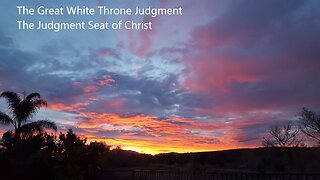 32:20
32:20
RemnantSeed
1 year agoThe Myth of Hell and Eternal Punishment
4201 -
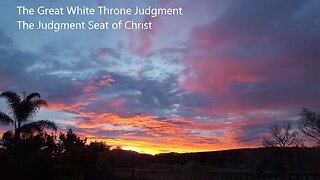 16:34
16:34
RemnantSeed
1 year agoIs Hell Eternal Punishment?
218 -
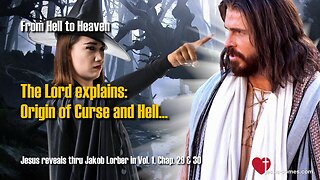 15:09
15:09
Jesus' Revelations thru Jakob Lorber English
10 months agoOrigin of Curse and Hell... Jesus elucidates ❤️ From Hell to Heaven
198 -
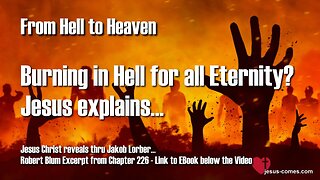 4:38
4:38
Jesus' Revelations thru Jakob Lorber English
10 months agoBurning in Hell for all Eternity ?... Jesus explains ❤️ Robert Blum in the Beyond... From Hell to Heaven
1122 -
 4:58
4:58
Holy Bible
1 year agoHoly Bible Mark 7
537 -
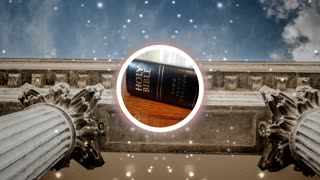 8:18
8:18
Holy Bible
2 years agoHoly Bible 2 Kings chapter 23
337 -
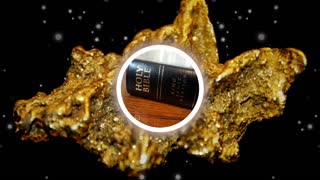 4:33
4:33
Holy Bible
2 years agoHoly Bible Lamentations 4
177 -
 6:03
6:03
Holy Bible
1 year agoHoly Bible Hebrews 11
2721 -
 58:47
58:47
Pastor Melissa Scott, Ph.D.
2 years agoRevelation 20 At the Judgment, Where Will You Be? -Heaven and Hell #27
94 -
 5:00
5:00
Holy Bible
3 years agoHoly Bible Judges chapter 3
306